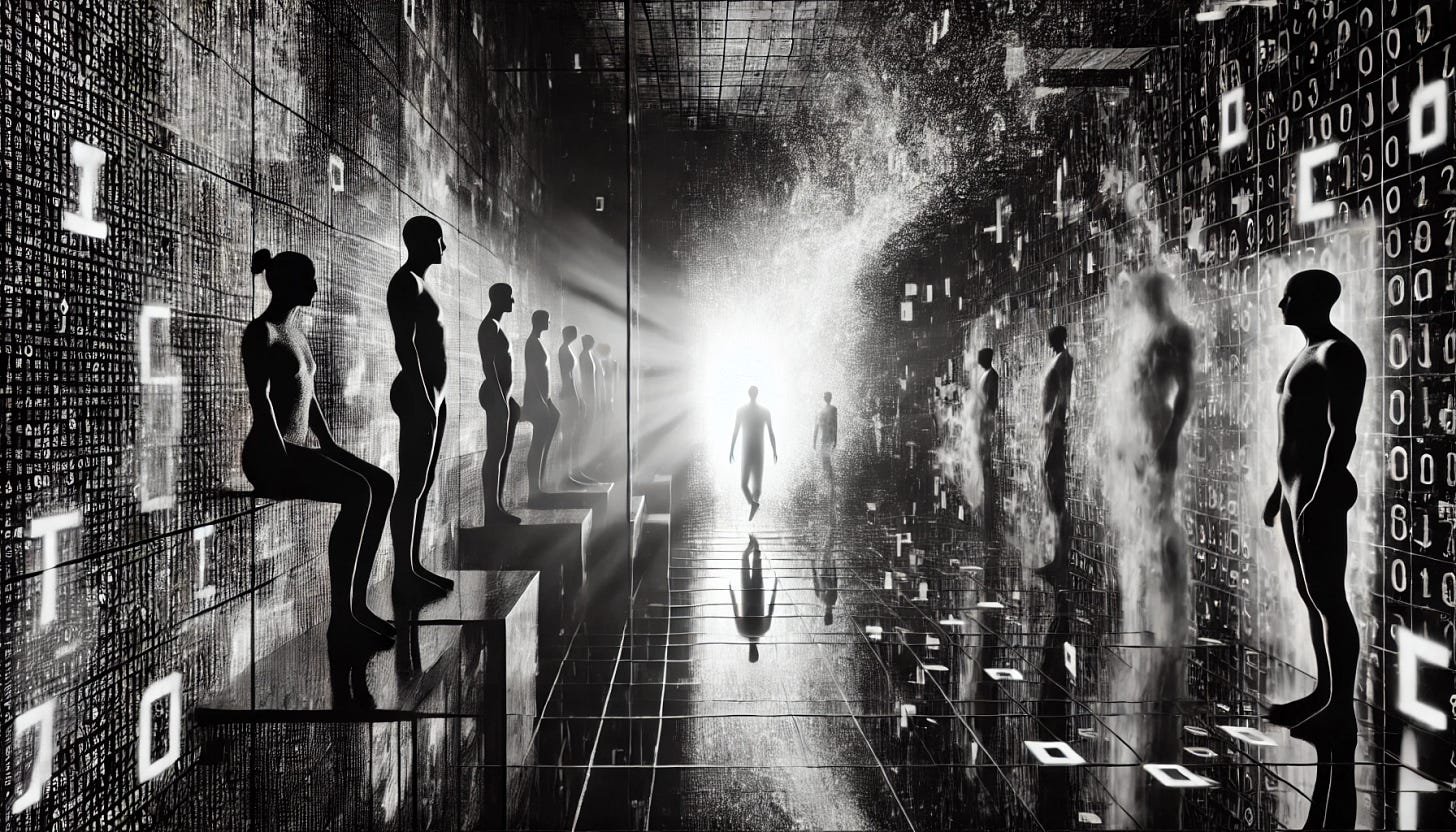"I don't know what's real anymore."
This sentiment echoes across classrooms, social media, and conversations as young people grapple with an increasingly AI-mediated world. It's not just academic concern or intellectual curiosity - it's a genuine emotional and existential crisis. When every image could be generated, every video could be fake, and even text could be AI-created, how do you find solid ground to stand on?
This isn't a theoretical problem. It's a lived experience for a generation coming of age in a world where reality itself seems increasingly fluid and uncertain. The rise of sophisticated AI tools has created a profound sense of ontological uncertainty - a deep questioning of what's real and what it means to know anything at all.
An Ancient Echo
If you're feeling this way, there's something important to understand: this kind of deep uncertainty about the nature of reality isn't new. In fact, you're grappling with questions that some of humanity's greatest thinkers have struggled with for thousands of years.
Twenty-four centuries ago, a philosopher named Plato wrote about a group of people who had spent their entire lives chained in a cave, able to see nothing but shadows on a wall. These shadows, cast by objects passing in front of a fire behind them, were their only window to the world. It was their entire reality - until one person was freed and discovered that everything they'd thought was real was just an illusion.
The parallels to our current moment are striking. Our screens, like the cave wall, show us representations of reality that we often take for reality itself. And like Plato's cave dwellers, we're increasingly aware that what we're seeing might be more complex, more constructed, than we initially thought.
The Emotional Weight
Let's acknowledge directly: realizing that your perception of reality might be limited or manipulated is terrifying. It can make you feel:
Lost and ungrounded
Suspicious of everything
Helpless and small
Isolated in your uncertainty
Foolish for ever believing anything
Exhausted from constant questioning
These feelings are valid. They're natural. And they're shared by countless others throughout history who've faced similar moments of radical doubt about the nature of reality.
Finding Solid Ground
Here's what Plato understood, and what's crucial for us to understand now: questioning reality isn't a sign that you're losing your grip - it's a sign that you're growing wiser. The cave prisoners who never questioned the shadows weren't more stable or happier - they were just more limited.
The discomfort, the questioning, the deep unease? These are the growing pains of developing a more sophisticated understanding of truth and reality. They hurt, yes, but they're leading somewhere important.
The Power of Community
Remember Plato's freed prisoner? They didn't figure everything out in isolation. After seeing the real world outside the cave, they went back to help others understand. This is crucial: we're not meant to face these big questions alone.
When we share our uncertainties and questions about AI and reality, we often discover that others are wrestling with the same concerns. This shared experience can be both comforting and enlightening.
Finding Your Way
How do we move forward in this uncertain landscape? Here are some guiding principles:
Honor your discomfort Your uncertainty isn't weakness - it's wisdom. Your questioning isn't paranoia - it's perception. The fact that you care about what's real shows something admirable about your character.
Connect with others Share your questions and concerns. Find people who understand. Build communities of trust and verification. We navigate uncertainty better together.
Develop new literacies Just as humans learned to read books critically, we can learn to read AI-mediated reality critically. This isn't about becoming perfectly certain - it's about becoming wisely skeptical.
Hold onto what matters Even in Plato's cave, the prisoners could form real relationships, have real conversations, feel real emotions. The shadows might have been illusions, but the human connections were real.
A Light in the Dark
Here's what gives us hope: throughout history, every major technological change has prompted similar crises of reality and meaning. The invention of writing, of printing, of photography, of film - each created new ways to manipulate and mediate reality. And each time, humans developed new wisdom and new tools for finding truth.
We're not losing our grip on reality. We're developing a more sophisticated understanding of it. This doesn't make the process less uncomfortable, but it might make it less frightening.
Moving Forward Together
The questions AI raises about reality and truth are profound. But they're not unprecedented. By understanding how thinkers like Plato grappled with similar questions about the nature of reality and knowledge, we can find both comfort and guidance. We're not alone in this struggle - we're part of a long human tradition of seeking truth amid uncertainty.
Remember: caring about what's real, being willing to face difficult questions, feeling the emotional weight of uncertainty - these are all signs of wisdom and humanity. As we navigate this new landscape together, we can learn not just to cope with uncertainty, but to use it as a catalyst for deeper understanding.


